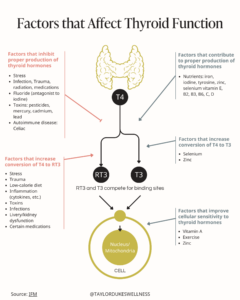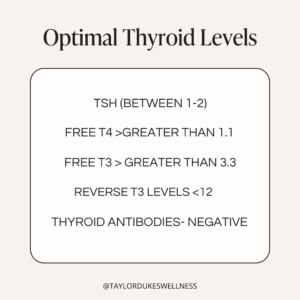Could You Have a Thyroid Disorder? What You Need to Know

Something seems a little off, and you might wonder, Do I have a thyroid problem?
Maybe fluctuations in your bodily temperature are tipping you off. Or you’ve noticed your hair isn’t as thick as it once was. Possibly your weight has shifted, even though you haven’t changed your diet or activity levels.
Before going to your doctor, read this article to ensure you are getting the correct labs drawn and know what to ask for. Not all doctors take a full look at how your thyroid is functioning, so it’s essential to speak up and advocate for your health.
What Does Your Thyroid Do?
Your thyroid is a small butterfly-shaped gland at the base of your neck. That tiny gland plays a significant role in your endocrine system. It helps communicate messages about your metabolism, heart rate, temperature regulation, and even your mood!
What Happens When Your Thyroid is Unbalanced?
Because your thyroid is responsible for regulating several bodily processes and functions when your levels are too high or too low, communication gets messed up, processes don’t work optimally, and symptoms appear.
SYMPTOMS OF LOW THYROID LEVELS (HYPOTHYROIDISM)
- Fatigue
- Always feeling cold
- Weight gain
- Dry skin
- Hair loss
- Irregular periods
- Constipation
SYMPTOMS OF ELEVATED THYROID LEVELS (HYPERTHYROIDISM)
- Anxiety/nervousness
- Increased sweating
- Heart palpitations
- Shaky hands
- Difficulty sleeping
- Hair and nails thinning
- Frequent bowel movements
- Weight loss
- Irregular periods
Imbalanced Thyroid Contributors
Several factors can contribute to imbalanced thyroid levels including:
- Underlying Infections
- Adrenal Issues: Too much cortisol will block TSH production
- Increased stress: Again, this leads to elevated cortisol
- Trauma
- Food sensitivities
- Damaged gut
- Toxins: Environmental toxins, heavy metals, mycotoxins
- Inflammation
- Thyroid surgery
- Radiation therapy
- Another current autoimmune disease: for example, celiac
- Nutrient deficiencies
- Low-calorie diets
- Liver and/or kidney dysfunction: T4 is converted to T3 in the liver
- Medications
- Poor lifestyle factors including sleep, nutrition, movement, love & connection, and stress

What Is Autoimmune Thyroid Disease?
Autoimmune thyroid diseases can also commonly cause hypothyroidism and hyperthyroidism.
- Hashimoto’s disease is linked to hypothyroidism (aka an underactive thyroid).
- Grave’s disease is linked to hyperthyroidism (aka an overactive thyroid).
Autoimmune thyroid disease is when your immune system attacks your own body, in this case, your thyroid. This keeps your thyroid from producing the optimal amount of thyroid hormone (resulting in Hashimoto’s). Or in some cases, it over-stimulates your thyroid and causes Grave’s disease.
In the beginning stages of an autoimmune thyroid disorder or thyroid disorder in general, you may just show slight symptoms, or they may be dismissed as other problems and it gets overlooked. However, if left untreated, it can progress into more severe health issues.
This is why you must get your thyroid checked with a comprehensive thyroid panel that includes thyroid antibodies to assess for any autoimmune thyroid component.
Why You Should See A Functional Medicine Provider For Your Thyroid Disorders
If you struggle with a thyroid issue, getting care from a functional medicine provider is highly recommended. Many conventional doctors are taught to only check TSH (thyroid-stimulating hormone) and Free T4 if you are on medications. Unfortunately, that doesn’t show you the full picture.
FUNCTIONAL LAB TESTING FOR THYROID DISORDERS
A functional medicine provider will order a comprehensive evaluation of multiple thyroid biomarkers to accurately see if your thyroid is working optimally and if your body is using those hormones correctly.
There are primary care practitioners who do not run full-spectrum thyroid panel testing, but comprehensive labs for thyroid markers are available to TDW Community members.

TSH
Thyroid-stimulating hormone (TSH) is released by the pituitary gland and tells your thyroid how much hormone to make. Measuring TSH levels can tell us if the communication between your pituitary gland (within your brain) and your thyroid is optimal. If your TSH levels are too high, it suggests you may have hypothyroidism.
FREE T4
T4 is known as Thyroxine and it’s the main output your thyroid produces. Knowing how much free FT4 is floating around in your bloodstream can tell us how much is still available to be converted into the active form.
FREE T3
When a specific area of your body needs energy, your T4 is converted into FT3. We need to measure these levels because your body may be producing T4, but not able to convert it to FT3. Chronic inflammation must be addressed to improve the conversion of Free T4 to Free T3. Unfortunately, this issue is very common and leads to hypothyroid symptoms.
REVERSE T3
T4 can also be converted into reverse T3. Since reverse T3 competes with FT3’s receptor sites, having elevated reverse T3 can lead to hypothyroidism symptoms. When this is seen on lab results, it’s mostly a consequence of systematic inflammation rather than from a thyroid issue.
THYROGLOBULIN ANTIBODY (TGAB) & THYROID PEROXIDASE ANTIBODY (TPO)
These labs can tell us if you may have an autoimmune thyroid disorder. Thyroid peroxidase antibodies attack the enzymes responsible for producing your thyroid hormones. Thyroglobulin antibodies attack thyroglobulin, which is a protein your thyroid uses to produce its hormones. If these levels are elevated, it’s a sign of Hashimoto’s.
Given all of the information the above levels can tell about your thyroid health, it is vital to get a full thyroid panel workup. Your conventional doctor may miss the fact that your thyroid disorder is actually an autoimmune thyroid disorder.
You can see why we need the full picture to thoroughly understand all of what’s going on with your thyroid. It’s not as simple as ordering a TSH and Free T4.
Your Thyroid Tests Results May be “Normal”, But Not Optimal

Even if your doctor does run a full thyroid panel, some doctors determine that your levels are “good” – but what’s considered “normal” by conventional healthcare standards is not always “optimal” from a functional medicine perspective.
I always go by labs and symptoms when I treat my patients.
Your levels could be on the edge of the “normal” thyroid level ranges. This means that certain processes in your body are not working at their full potential, and will mostly likely cross that line of “abnormal” given some time or may be causing symptoms. If a functional medicine provider sees your thyroid levels are within the normal range, but on one end of the spectrum, they will likely recommend lifestyle, supplement and dietary changes while monitoring the thyroid more closely.
If your thyroid is not optimal and you need medication management, it is important to have your thyroid managed by someone experienced.
Functional Medicine Approach to Thyroid Disorders
Unlike conventional doctors who may hand over levothyroxine or another prescription for the rest of your life, functional medicine providers use dietary, lifestyle, supplement, and sometimes medications to improve thyroid function.
It is important to know that thyroid medication can be life-saving and sometimes necessary. But, we still believe lifestyle changes can significantly and positively impact your thyroid imbalances.
Diet Changes
- Avoid gluten. The structure of gluten’s protein is very similar to your thyroid. If you consume gluten, your immune system may react to your thyroid tissue by producing antibodies. This is known as molecular mimicry.
- Eat a nutrient-dense, whole-food diet. This ultimately supplies the body with the nutrients it needs to synthesize hormones properly. Avoid processed and packaged foods.
- Consume anti-inflammatory-rich foods such as berries, citrus fruits, omega 3-rich foods like salmon, extra virgin olive oil, etc. Inflammation caused by a poor diet can make your thyroid condition even worse.
- Focus on gut health. Grab one of my favorite gut healers…organic bone broth (use code TAYLORDUKESWELLNESS)! Better yet, join my comprehensive gut reset program called Get Your Gut Right for healing from the inside out!
- Consider food sensitivity testing in order to determine whether or not gluten and/or other foods are causing inflammation and imbalance in the body. Food sensitivity testing is something we offer through the TDW Community if you are not currently working with a provider who can order this test.
- Consider getting a comprehensive nutritional analysis test in order to determine whether or not you are low in particular nutrients that are important for thyroid health. Again, this testing is available via the TDW Community if you are not currently working with a provider who can order it.
Lifestyle Changes
- Prioritize sleep! I know it may be hard for some of us mamas with little ones or working professionals, but it is so important. Aim to get at least 8 hours of quality sleep each night.
- Manage stress levels. Create a balanced work/life schedule. Write your self-care days on the calendar, so you don’t brush this aside!
- Throw out your toxic products. I’ve swapped all of my cleaning products with trusted Branch Basics products (use code TAYLORDUKESWELLNESS for a first-time customer discount). Find a master list of all of my best tried-and-true non-toxic swaps HERE.
- Detoxify the body by working on drainage pathways – bowel movements, sweat, breath, and urine. This will improve the health of your liver and kidneys. The TDW Community has access to an entire guide on the foundations and how-tos of detox pathways.
- Address underlying infections: dormant infections can cause thyroid dysfunction, especially in stressful times.
- Talk with your provider about certain medications you may be currently taking which have the possibility of negatively affecting your thyroid.
- Incorporate regular, consistent movement into your days. This doesn’t mean you have to join a gym or train for a marathon (over-exercise can be harmful to the thyroid!), but daily movement is important and foundational to overall health and wellbeing, including thyroid and thyroid hormone health.
Supplement Changes
- Consider supplementation. Selenium, iodine, and zinc are all great thyroid-supporting nutrients.
- If you need to take thyroid meds, you may consider talking to your doctor about taking a T3/T4 combo, or adding T3 to a current T4.
Take a Deeper Dive with Me!
I created TDW Community as a space where wellness warriors could grow their knowledge and feel empowered with their health. When you become a member, you get access to functional medicine expertise from me and my team, a digital library of exclusive wellness content like deep dives on detoxing, parasite cleansing and more, live monthly Q&As with me and more. I hope you join us – it would be an honor for me and my team to serve you in this way!
Stay Updated on All Things Wellness
At Taylor Dukes Wellness, we are always working on new ways to serve you on your health journey. Be the first to learn about new healthy living resources, blog posts, and TDW offerings, by getting on my insider list here.
Share This Post:
Your Wellness Deep Dive
- Be the first to learn about new healthy living resources, blog posts, and exclusive TDW offerings by getting on my insider list.
- Find healthy living products with ingredients you can trust – the same ones I personally use for myself and my family – in the TDW Shop. Check out our protein powders, electrolytes, supplements, and more!
- Get personalized support through the TDW Community. When you become a member, you get access to functional medicine expertise from me and my team, functional medicine lab testing and 1:1 consults, a digital library of exclusive wellness content, live monthly Q&As with me, and so much more!
YOU MAY ALSO LIKE:
Helping you get your gut right, improve energy, boost immunity, balance hormones, sleep better and look + feel your best
DISCLAIMER
PRIVACY POLICY
TERMS + CONDITIONS
ACCESSIBILITY
© 2025 Taylor Dukes Wellness
LEARN
SHOP
ABOUT
TDW Community
Free Guides
Blog
TDW Store
Fullscript
About Taylor
Press
Contact
COOKIE POLICY
SITE CREDIT
Trusted Products



